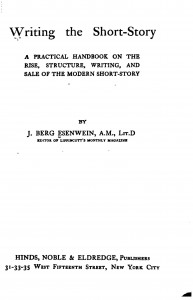Follow Scott
Recent Tweets
- Waiting for Twitter... Once Twitter is ready they will display my Tweets again.
Latest Photos
Search
Tags
anniversary Balticon birthdays Bryan Voltaggio Capclave comics Cons context-free comic book panel conventions DC Comics dreams Eating the Fantastic food garden horror Irene Vartanoff Len Wein Man v. Food Marie Severin Marvel Comics My Father my writing Nebula Awards Next restaurant obituaries old magazines Paris Review Readercon rejection slips San Diego Comic-Con Scarecrow science fiction Science Fiction Age Sharon Moody Stan Lee Stoker Awards StokerCon Superman ukulele Video Why Not Say What Happened Worldcon World Fantasy Convention World Horror Convention zombies
©2025 Scott Edelman
Writing advice from 1908—Part II
Posted by: Scott
Tags:
old magazines
Posted date:
February 11, 2008 |
No comment
As I continue reading through Dr. J. Berg Esenwein’s 1908 book Writing the Short-Story: A Practical Handbook on the Rise, Structure, Writing and Sale of the Modern Short-Story (here are my first comments), I find myself drawn far more to the business side of the writing life a century ago than to any artistic advice offered.
I guess that’s because I feel that the business model of writing will always change, while the art itself is eternal. (Though I may learn differently once I dive into his century-old writing exercises.) I’m finding the differences between then and now fascinating, such as the doctor’s answer to the question:
What is the best way to sell a short-story manuscript?
There are four ways, each having merits of its own.
Esenwein then tells us about “1. The Ordered Manuscript,” which I would compare to the story solicited today for an invitation-only anthology, “2. The Literary Agency,” which we would all still clearly understand, and “4. Offering the Story by Mail,” which is still practiced by contemporary writers, only many times that mail is now e-mail. But the tip that I find most fascinating is his suggestion that a writer show up at an editor’s office, with the following advice on behavior:
3. Calling on the Editor
Many writers—chiefly those who are inexperienced—think that a personal interview with an editor will further the interests of their manuscripts. Therefore they use ingenious devices to secure a little—or much—of his time, from the letter of introduction to the plea that “a lady wishes to see the editor upon an important errand.”
The practice among editors as to meeting unknown writers is as various as it is with other busy men and women. But, no matter who you are or who introduces you, it is a mistake to suppose that a personal talk will help the chances of your manuscript. It may even prepossess the editor unfavorably. Upon the other hand, the editor may be able to give you valuable hints as to his special needs and likings. After that, it rests with the story.
But, says the novice, how can I be sure that my manuscript will be read by the editor himself unless he promises me to do so?
Really, you cannot be sure; but you may be certain that the editor’s assistants, who will read your story first, are as competent as the editor himself to say if your manuscript contains any promise; and that if it is promising, nothing can keep the editor from reading it, so eager is he to find materials suitable for his pages.
No editor is too busy to meet for the first time an author whose work he has accepted, or known from its having appeared in other periodicals; the length of that first call and the question of after visits, good taste alone will dictate. No man ever gained anything by being a bore.
Never expect an editor to read your story while you wait. He must do his work in a methodical fashion in order to get through at all; besides, he prefers to read it when his mind is undisturbed by any outside force . As I have already said, an editor’s only stock in trade is his judgment, and naturally he is suspicious of any attempt to force it.
When you leave your manuscript with the editor, do not insist upon an answer inside of two or three weeks. It may come earlier, but do not demand it. And do not forget to leave postage—not loose postage stamps, but a stamped and carefully addressed envelope of a size to fit your manuscript. You are a salesmen trying to dispose of your product in a crowded market, and the easier you make it to handle your manuscript—yes, even to the extent of making it easier to return it—the more cheerfully will your story be examined. It is a simple case of buying and selling.
One word more: A “hard luck story,” true and sorrowful though it may be, will not influence the editor to buy your work. How could it? He is employed by a publisher who demands results, and the editor soon learns that it is cheaper, and more honest, to give charity from his private purse—never a fat one—than to allow his judgment to be swerved by sympathy.
If the thought of selling short stories by paying visits to editors isn’t stunning enough—and for this editor of Collier’s Monthly to share it as a tactic must mean that it wasn’t out of the ordinary—the advice that a writer shouldn’t demand a response in under two or three weeks—implying that a two-to-three-week turnaround time was standard—is enough to make me swoon.
I guess times really have changed!

